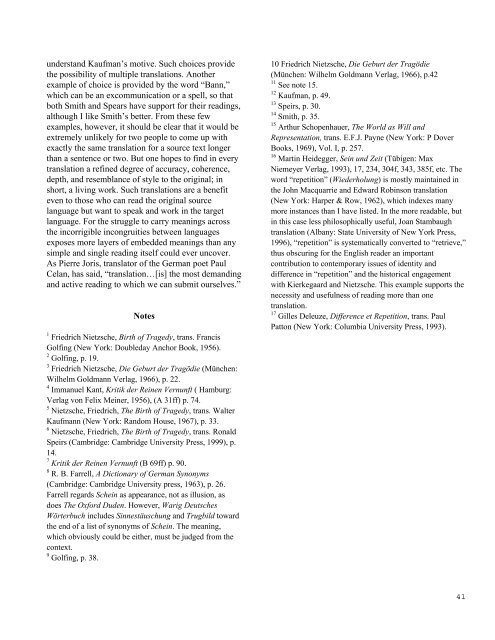their - The University of Texas at Dallas
their - The University of Texas at Dallas
their - The University of Texas at Dallas
Create successful ePaper yourself
Turn your PDF publications into a flip-book with our unique Google optimized e-Paper software.
understand Kaufman’s motive. Such choices provide<br />
the possibility <strong>of</strong> multiple transl<strong>at</strong>ions. Another<br />
example <strong>of</strong> choice is provided by the word “Bann,”<br />
which can be an excommunic<strong>at</strong>ion or a spell, so th<strong>at</strong><br />
both Smith and Spears have support for <strong>their</strong> readings,<br />
although I like Smith’s better. From these few<br />
examples, however, it should be clear th<strong>at</strong> it would be<br />
extremely unlikely for two people to come up with<br />
exactly the same transl<strong>at</strong>ion for a source text longer<br />
than a sentence or two. But one hopes to find in every<br />
transl<strong>at</strong>ion a refined degree <strong>of</strong> accuracy, coherence,<br />
depth, and resemblance <strong>of</strong> style to the original; in<br />
short, a living work. Such transl<strong>at</strong>ions are a benefit<br />
even to those who can read the original source<br />
language but want to speak and work in the target<br />
language. For the struggle to carry meanings across<br />
the incorrigible incongruities between languages<br />
exposes more layers <strong>of</strong> embedded meanings than any<br />
simple and single reading itself could ever uncover.<br />
As Pierre Joris, transl<strong>at</strong>or <strong>of</strong> the German poet Paul<br />
Celan, has said, “transl<strong>at</strong>ion…[is] the most demanding<br />
and active reading to which we can submit ourselves.”<br />
Notes<br />
1 Friedrich Nietzsche, Birth <strong>of</strong> Tragedy, trans. Francis<br />
Golfing (New York: Doubleday Anchor Book, 1956).<br />
2 Golfing, p. 19.<br />
3 Friedrich Nietzsche, Die Geburt der Tragödie (München:<br />
Wilhelm Goldmann Verlag, 1966), p. 22.<br />
4 Immanuel Kant, Kritik der Reinen Vernunft ( Hamburg:<br />
Verlag von Felix Meiner, 1956), (A 31ff) p. 74.<br />
5 Nietzsche, Friedrich, <strong>The</strong> Birth <strong>of</strong> Tragedy, trans. Walter<br />
Kaufmann (New York: Random House, 1967), p. 33.<br />
6 Nietzsche, Friedrich, <strong>The</strong> Birth <strong>of</strong> Tragedy, trans. Ronald<br />
Speirs (Cambridge: Cambridge <strong>University</strong> Press, 1999), p.<br />
14.<br />
7 Kritik der Reinen Vernunft (B 69ff) p. 90.<br />
8 R. B. Farrell, A Dictionary <strong>of</strong> German Synonyms<br />
(Cambridge: Cambridge <strong>University</strong> press, 1963), p. 26.<br />
Farrell regards Schein as appearance, not as illusion, as<br />
does <strong>The</strong> Oxford Duden. However, Warig Deutsches<br />
Wörterbuch includes Sinnestäuschung and Trugbild toward<br />
the end <strong>of</strong> a list <strong>of</strong> synonyms <strong>of</strong> Schein. <strong>The</strong> meaning,<br />
which obviously could be either, must be judged from the<br />
context.<br />
9 Golfing, p. 38.<br />
10 Friedrich Nietzsche, Die Geburt der Tragödie<br />
(München: Wilhelm Goldmann Verlag, 1966), p.42<br />
11 See note 15.<br />
12 Kaufman, p. 49.<br />
13 Speirs, p. 30.<br />
14 Smith, p. 35.<br />
15 Arthur Schopenhauer, <strong>The</strong> World as Will and<br />
Represent<strong>at</strong>ion, trans. E.F.J. Payne (New York: P Dover<br />
Books, 1969), Vol. I, p. 257.<br />
16 Martin Heidegger, Sein und Zeit (Tübigen: Max<br />
Niemeyer Verlag, 1993), 17, 234, 304f, 343, 385f, etc. <strong>The</strong><br />
word “repetition” (Wiederholung) is mostly maintained in<br />
the John Macquarrie and Edward Robinson transl<strong>at</strong>ion<br />
(New York: Harper & Row, 1962), which indexes many<br />
more instances than I have listed. In the more readable, but<br />
in this case less philosophically useful, Joan Stambaugh<br />
transl<strong>at</strong>ion (Albany: St<strong>at</strong>e <strong>University</strong> <strong>of</strong> New York Press,<br />
1996), “repetition” is system<strong>at</strong>ically converted to “retrieve,”<br />
thus obscuring for the English reader an important<br />
contribution to contemporary issues <strong>of</strong> identity and<br />
difference in “repetition” and the historical engagement<br />
with Kierkegaard and Nietzsche. This example supports the<br />
necessity and usefulness <strong>of</strong> reading more than one<br />
transl<strong>at</strong>ion.<br />
17 Gilles Deleuze, Difference et Repetition, trans. Paul<br />
P<strong>at</strong>ton (New York: Columbia <strong>University</strong> Press, 1993).<br />
41

















